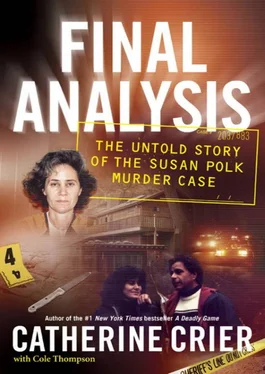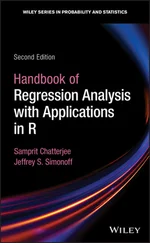Catherine Crier
with Cole Thompson
FINAL ANALYSIS
The Untold Story of the Susan Polk Murder Case
For my family, especially my parents, Ann and Bill.
Our first, best teachers.
With all the talk about living in the moment and the power of now, how easy it is for some to pretend that complicated, stressful, or traumatic events we live through as children and adolescents have little to do with the way we come to live as adults—that early chapters in our life stories don’t really influence the chapters we are writing today, much less those we will pen tomorrow. We are, the most zealous behaviorists would argue, masters of our own destinies, with only bad habits to break, unfettered by unconscious psychological conflicts and dynamics.
Yet the story of every individual I have evaluated in fifteen years as a psychiatrist, several of them while specializing in forensic psychiatry, belies that sort of pure here-and-now reasoning. In every instance, from cases of major depression and panic disorder to those involving seemingly inexplicable and horrifying violence, I have been able to “connect the dots” back to complicated, stressful, traumatic, or catastrophic events in a person’s recent or much more distant past.
When I offered my views on Scott Peterson’s psychological makeup on Catherine Crier Live, for example, I didn’t limit my exploration of Peterson’s psyche to the events of December 24, 2002, the day he killed his wife Laci and her unborn son Conner. I didn’t restrict it to the five years he and Laci had been married. I looked all the way back to the barren psychological landscape of his childhood, a childhood that included severe emotional deprivation that rendered him unable to form genuine human connections or feel real empathy for anyone. Making sense of Scott Peterson’s monstrous deeds required unearthing the ways in which he, himself, was psychologically murdered.
It is no different, in the final analysis (to borrow Catherine’s apt title), in the case of Susan Polk, who murdered her husband Dr. Felix Polk. Because, as Catherine makes so clear and compelling in the pages that follow, the story of that murder has roots not only in the couple’s tumultuous marriage and impending divorce, but deep in their pasts as well.
Susan Polk was only fifteen years old when her mother took her to Felix, a psychologist, for treatment, but already she bore the psychological scars of being abandoned by her father and alleged abuse as a child.
Felix Polk had traveled his own rocky psychological terrain. He bore scars, including debilitating anxiety and depression. He had tried to take his own life.
How did Felix Polk—who many describe as a very intelligent and insightful man—miss the way in which his desire to be safe from critical and controlling women led him to romance his vulnerable, teenage patient? How could he not see the perfect storm gathering from the day he first met her and imagined her as his lover? Didn’t he wonder whether prior trauma, not genuine affection, was the reason she didn’t object to his request that she sit on his lap in later sessions? Did he really believe that, as a slight, average-looking man in his forties, he was the lucky recipient of pure love from a pretty teenager? How could he not see that in having sex with her and marrying her he was violating the most sacred boundary between doctor and patient, that he would be the rightful heir to all the repressed, primitive, churning rage she harbored toward the controlling and abusive men in her life? Was he so narcissistic as to believe he could contain it, rather than be destroyed by it?
And how did Susan Polk, with all her intellect and familiarity with psychological lingo, miss the fact that the murderous intent building inside her was not only meant for Felix, but for her father and her brother and for God knows who else? How did she not realize that the stabbing of her husband was the culmination of her fury at those forces she believed had deprived her of personal freedom? How did she not see it would lead to the ultimate surrender of her liberty—to life in prison? How did she miss the fact that her three sons would be effectively orphaned, left without a father (as she had been), abandoned by their mother (as, in many ways, she was).
How did Felix and Susan Polk not see all of this?
The answer is that they were lost in a drama neither really understood nor controlled. It was a drama that, like so many, was built on powerful and painful events and themes from the past, about to seep into and commandeer the present. It was bigger than either of them, a juggernaut.
So it takes Catherine Crier, possessed of fierce intellect and unbridled curiosity about human emotion and behavior, to reconstruct and tell the tale for us, to take us into a murder investigation and find a story not only of violence, but of desperation, passion, and betrayal. How lucky that the work should fall to her. For no viewer of Court TV could hope for a better host, and no reader of true crime could hope for a better guide.
Final Analysis is Catherine Crier at her best. In these pages, she delivers what I and so many others have come to rely on her for: her trademark legal and psychological insight into the human condition, and how it can turn deadly in an instant.
—Keith Ablow , MD
“Mom fuckin’ shot dad with a shotgun!” fifteen-year-old Gabriel Polk shouted into the receiver. His older brother, Adam, was on the other end of the phone line. “Yeah, fucking crazy bitch! We still have an apartment house. We still have an apartment. We get income. We are [inaudible]. We can keep it, I think. Dad left us a pile of [inaudible]. That’s for sure.”
Gabriel had been up all night, speaking with police after finding his seventy-year-old father dead, bathed in blood on the floor of the family’s pool house, about 50 feet from their home in Orinda, California. It was 10:15 AM on October 15, 2002, and the teen had just completed a lengthy interview with detectives from the Contra Costa Sheriff’s Office when he was told that Adam was on the phone.
“Yeah. Fuckin’ crazy bitch! I stumbled in on dad,” he explained. “No, no. She just shot him in the fuckin’ chest. Fucking crazy bitch. I had to call 911 and shit. They have like our whole house under police inspection or something.
“What the hell is wrong with her? I hope they give her the fucking death penalty…[inaudible].”
The sound of footsteps prompted the boy to end his conversation abruptly.
Peering into the cramped interrogation room, an investigator asked, “Are you still on the phone?”
“No,” Gabriel shot back. He was naked from the waist up. He had been so upset at the sight of his dead father in the pool house that he had left the residence barefoot, wearing only a pair of shorts. His usually bright brown eyes were bloodshot and framed by dark circles.
“Did the trauma guy say what we are going to do?” the officer asked.
“Just bring a sleeping bag,” Gabriel shrugged.
“Yeah, for right now…. We are going to have to get you a sleeping bag and a pillow. And we will resolve this as soon as we can.”
“I would like to know what is going to happen to us financially,” Gabriel said.
“Financially?” the officer repeated. “What do you mean?” It seemed an odd question coming from a boy who’d just discovered his father murdered—particularly when the boy’s own mother was the prime suspect.
Gabriel then brought up an apartment complex the family owned in San Francisco’s East Bay. “I don’t know what is going to happen right now, but I would like to hold onto that because we need a source of income.”
Читать дальше











